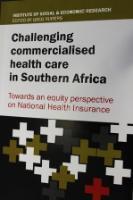
The Institute for Social and Economic Research at Rhodes University has produced a powerful publication that is likely to make a valuable contribution to the debate around private healthcare and Government’s proposed National Health Insurance (NHI).
The book Challenging commercialised health care in Southern Africa: Towards an equity perspective on National Health Insurance and focuses on how to create equitable access to health financing and medical insurance in the South African region.
The book, funded by the Southern Africa Trust and co-ordinated by the ISER within the Regional Network on Equity in Health in Southern Africa (EQUINET), is based on a three-year research programme to better understand the challenges and limits of the for-profit health care sector in the Southern African region.
In its eight chapters -- authored by 11 writers who hold vast expertise across the health, economics, legal and development spectrum -- the book explores market versus equity approaches to health, reviews the debate around the NHI in the light of international experience, and explores the development of private medical aid societies in the Southern African Region.
The book points out that by 2010 seven million out of South Africa’s 49 million people derived some R74 billion of health benefits compared to 42 million who were excluded and had to make do with R71 billion spent in the public sector. The public health sector also had to contend with the flight of doctors and nurses to the private-for-profit general hospitals
Although the NHI in South Africa has been billed as a way of addressing SA’s extreme healthcare inequities and giving universal access to quality healthcare, the book asks important questions about whether it will address real concerns around privatisation of healthcare, says the book’s editor, ex-director of the ISER and current ISER senior research associate, Prof Greg Ruiters.
“We argue that it’s impossible to talk about the problem of the public sector without looking at the private sector. The majority of the doctors, pharmacists and nurses in this country work in the private sector and serve a small percentage of the population.”
Prof Ruiters said the NHI offered the country a fundamental opportunity for nation building.
“We are one country and need to share resources and look after each other. It’s about bringing the middle-classes into the mainstream of public health, which will have an enormous effect on improving the system.
“The middleclass won’t stand for inferior facilities and the working class shouldn’t be forced to either. It could help build class solidarity among groups that have drifted apart. Why have duel systems of service provision across the board whether with education or health? It’s why South Africa is the most unequal society in the world. The NHI crystalizes all these policy debates and if it does work it can help us fix the State up in other areas.”
ISER director Robert Van Niekerk dismisses critics of the NHI who have urged government not to tinker with the private healthcare system because it works.
“The truth is that the system is not working and it’s not cost effective for the middle classes. The only reason it works is because it’s largely propped up by the government which incentivises private medical care through tax subsidies.
The middle-classes should be incentivised to improve public health care – the essential health care package proposed by the NHI is aimed at doing this by making healthcare both equitable as well as more cost-effective than that provided by the private sector.
The NHI is also based on principles of universalism and social solidarity – the implementation of these far-reaching social democratic principles will compel the middle-class to be more directly engaged with the transformation of health care to the benefit of the many and not just the insured few.
Prof Van Niekerk said the book was a valuable resource that would inform the debate around the NHI.
“That is a big part of what the ISER seeks to do: Engage with and influence policy debates and ultimately contribute to creating a more democratic, equitable and socially just society. That is why it is important to produce a book like this which is academically rigorous but also accessible in terms of the policy debate.”
The book is available free of charge. It has been made available to NGOs, academics, government and students across the country. An updated and extended second volume will be published by Kwa-Zulu Press in 2012.
